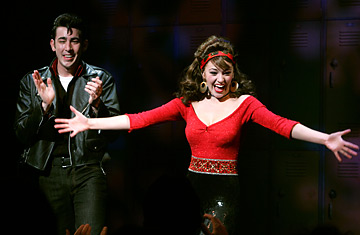
Actors Max Crumm and Laura Osnes during the curtain call for the opening night of the Broadway musical Grease on August 19, 2007, in New York City.
Reality shows can humiliate B-list celebrities on national television, force people to live for weeks in confined spaces with psychotic strangers, and even flirt with child abuse (as some have accused CBS's upcoming Kid Nation of doing). But tamper with the sanctity of Broadway? Now you're asking for trouble. At least, that seemed to be the reaction in some quarters to Grease: You're the One That I Want, the NBC reality show last winter in which home viewers got to select which two of a dozen young acting hopefuls would get to star in a new Broadway revival of the musical Grease.
Now the winners — Max Crumm and Laura Osnes — and their show are on Broadway, and the critics have dutifully taken up their assigned role, heaping scorn on this populist invasion of the Great White Way. The New York Post called the new Grease "sad"; the Daily News found it "lackluster." Sniffed Ben Brantley in the Times, the show "feels like a musical put on by a high school — and I don't mean a high school of performing arts." Ouch.
Well, a couple of days after seeing Grease, I happened to be sitting around a breakfast-room table with a half-dozen 13-year-old girls. They had just finished watching the sequel to High School Musical on the Disney Channel, and they weren't very thrilled with it. But they were eager to hear about Grease. All of them had watched the reality show, and though a few thought that Derek should have beaten out Max for the role of Danny Zuko, they were dying to see the Broadway revival. Which is sort of what we're going for here, isn't it? I mean, getting a new generation excited about theater again?
But you don't have to be an impressionable 13-year-old, or a program executive at NBC, to get a kick out of Kathleen Marshall's exuberant and winning new revival. It may not be a Grease for the time capsule, but it's the one that I want.
How do Crumm and Osnes do in their Broadway debuts? Not bad at all. As Danny and Sandy, the teen summer-lovebirds each vying for acceptance by the cool crowd at Rydell High, they lack a certain amount of big-stage charisma. Crumm has the winsome, quizzical look of a class clown who gets the girl only by accident, not the heartthrob played by John Travolta in the 1978 film. And Osnes's lovely, sculptured singing voice does struggle at times to get heard over the small but well-miked house band. But they perform all the dance moves required, don't have any trouble with the lines, and (unlike some others in the cast) actually are convincing as high school students. You could do a lot worse.
And you can't do much better than Kathleen Marshall, the choreographer and director who has proved to be without peer in taking faded old musicals (Wonderful Town, Pajama Game) and giving them a fresh modern shine. Here she keeps everything sprightly and speedy without overwhelming her young stars. The dance numbers go for group precision over virtuoso acrobatics. Derek McLane's sets are bright and witty, from the stacks of school lockers or cars at a drive-in movie, to the neon ice cream cone that opens to reveal the hunky Teen Angel in the terrific "Beauty School Dropout" number. Marshall has beefed up the original score with the excellent songs written for the 1978 film (including "Hopelessly Devoted to You" and "You're the One That I Want"). Best of all, she doesn't poke us in the ribs to make sure we're getting the parody of '50s clothes, styles and attitudes, or push for more social significance than the fragile little spoof can bear — the way, for instance, Hairspray and Legally Blonde do just down the street.
Indeed, this Grease holds up a lot better than I would have imagined. I saw the original production in the '70s, and back then it seemed a pretty lame attempt to cash in on the still relatively new vogue for '50s nostalgia. Today, after a hundred clunkier send-ups of the period (we're twice as many years removed from Grease, which opened on Broadway in 1972, as the original show was from the doo-wop era it poked fun at), the show has the purity of an archetype, and even a few serious points to make about the adolescent pressure to conform, the glamour of the outcast, and the conflict between authenticity and "cool." Even the old Jim Jacobs-Warren Casey songs have more wit and resonance than I recall — like the simple girl-boy counterpoint in "Summer Love":
Tell me more, tell me more,
Was it love at first sight?
Tell me more, tell me more,
Did she put up a fight?
You try coming up with a neater distillation of how girls and guys at a certain age view the opposite sex, all in words of one syllable. You try building a Broadway show around two amateur stars and coming up with something as effortlessly enjoyable as this.
